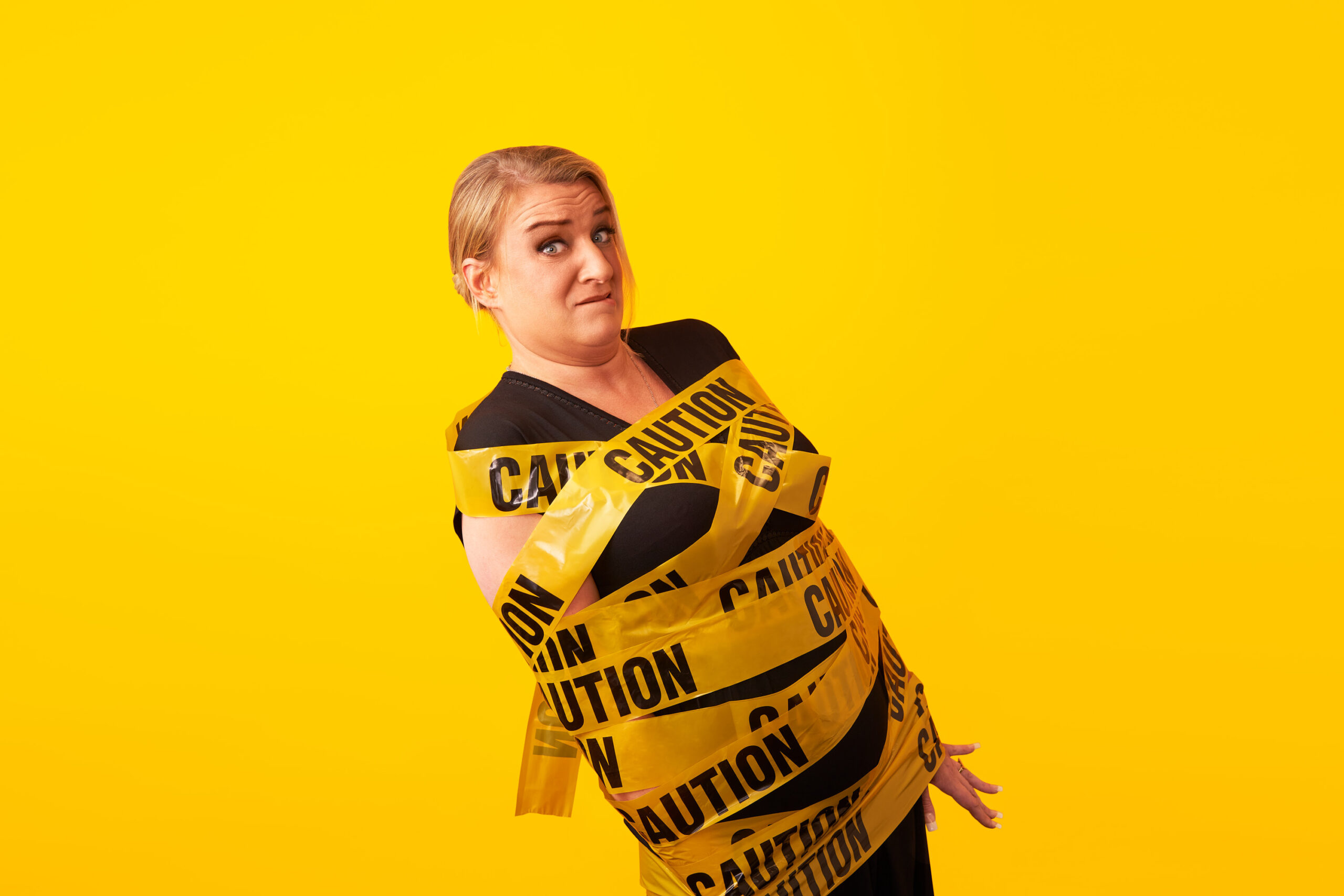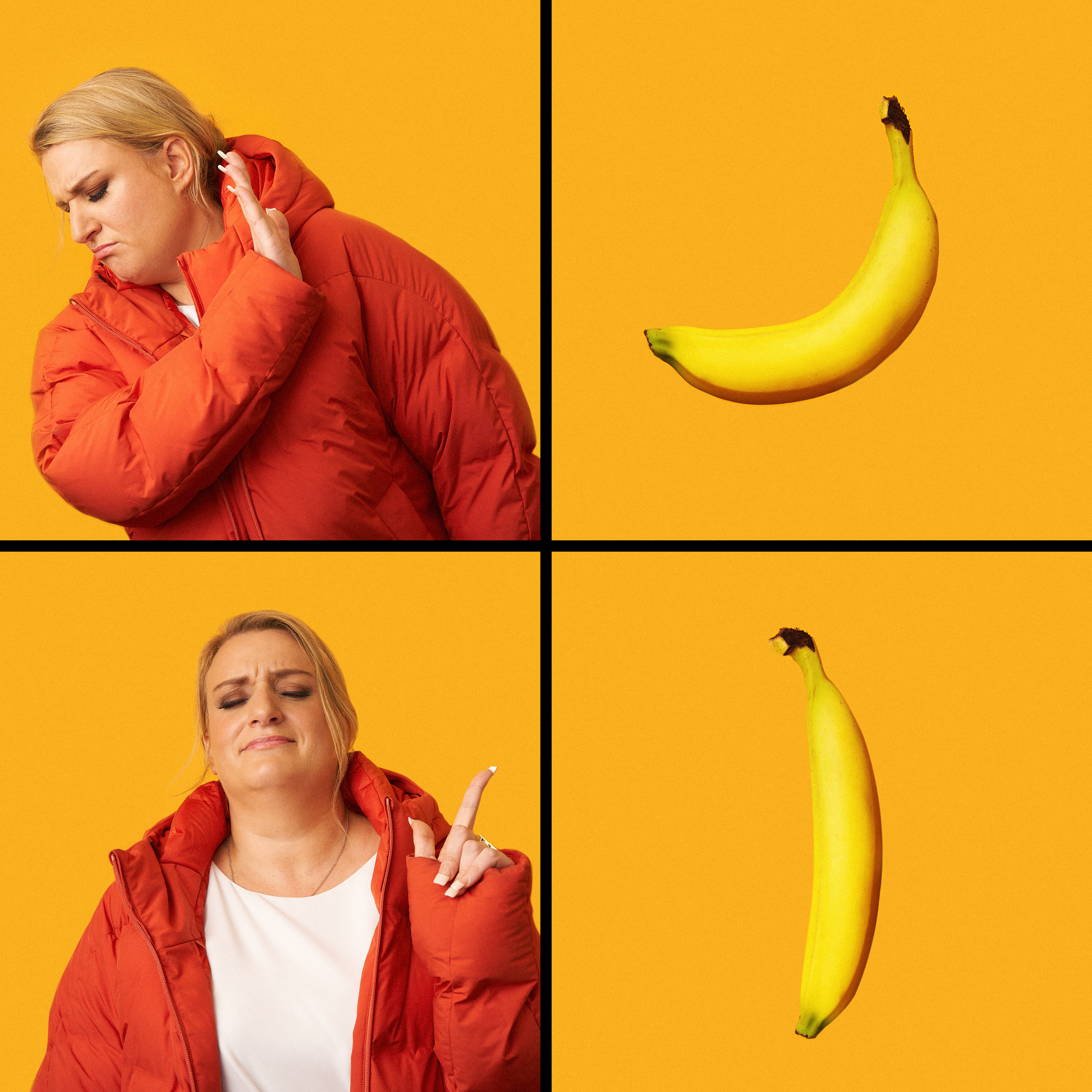
- Home |
- Search Results |
- Daisy May Cooper: ‘I love being famous!’
Daisy May Cooper: ‘I love being famous!’
It's been a long, hard road for the creator of This Country, who grew up in poverty and chaos before finding an unconventional route into stardom. Her brilliant new memoir Don't Laugh, It'll Only Encourage Her tells the whole story.
Daisy May Cooper shares her home with ghosts who haven’t “crossed over”. Outside, there’s a hanging tree; inside, there’s a spirit box beeping out a message in Morse code. A Roman roams the house after walking out of the wardrobe.
This is all according to her housekeeper – a medium who lent Cooper cash when she was desperate, so the first thing the actor and writer did when she got some money of her own was to employ her. “She doesn’t do much except fart around and talk, but it’s worth having her about,” she tells me. “It’s mostly bollocks. I’d like to believe her, but my house is only two years old, and I’m the only person who’s ever lived in it.”
Cooper, 35, and her younger brother Charlie have always loved the supernatural. If she spends the night in a new place, she asks the room if there’s anybody there. Only once has there been a reply: she plays me a recording from an overnight stay in hospital, of an ethereal voice whispering, “don’t be afraid”. “That’s the way we were raised,” Cooper says. “We’ve always been searching for stuff. Growing up, it was all about the spirit world.”
In Cooper’s memoir, Don’t Laugh, It’ll Only Encourage Her, she explains why that took root. When Cooper was a child, her aunt died suddenly in a car accident. Desperate to contact her sister, Cooper’s mother Gill started to take Daisy along to séances in pubs and spiritualist churches. It’s a period Cooper recounts in vivid, heartbreaking detail – she remembers her mother and grandmother swaying in the front room to 'Take My Breath Away' by Berlin – while appreciating her life's cavalcade of absurdity: after this, they were constantly burning objects in the garden for fear they had brought them bad luck.
'The plaster in Dad’s study was breaking loose from the wall, and I began eating it. It was fucking fantastic, like a savoury meringue'
Acting was the only thing Cooper ever wanted to do, but she has always struck the greatest chord telling stories of her own. As a child, her claims that she heard the voices of The Borrowers in her head prompted a visit to a psychiatrist. As an adult, her guide to Cirencester’s haunted hotspots was published in the Wilts and Glos Standard. Later, after graduating from RADA to years of rejection and almost losing all hope. She and Charlie poured their memories of growing up working class in the Cotswolds into This Country, the superb, richly observed, and quietly moving comedy about the bored cousins Kerry and Kurtan Mucklowe and the isolation and eccentricity of rural England. It ran for three series from 2017 to 2020 and won the Coopers five Baftas between them.
Don’t Laugh, It’ll Only Encourage Her takes us from Cooper’s childhood in Cirencester – where she still lives, known locally as “Daisy who pissed on a gym mat in Year 3” – through to her experiences at drama school; the brutal, crushing reality of the industry she entered after it and the long, hard journey to get This Country on television, alongside highly entertaining memories of accidental exotic dancing, Eurocamp brochures, a Sylvanian Families massacre and a boyfriend who wanted her to treat him like a human ashtray (and then dumped her for being too vanilla). “I don’t know why I’m fly paper for all these humiliating experiences, but I am,” she quips.
Cooper is riotous company: with her makeup pristine ahead of a day’s photoshoots, she warns: “I might be shagging someone later”. Her memoir is brilliantly funny, too: in one chapter she describes bonding with Charlie over their mutual love of plaster: “The plaster in Dad’s study was breaking loose from the wall, and I began eating it. It was fucking fantastic, like a savoury meringue”.
Like This Country, though, the book refracts tragedy to devastating effect, and is frank in its depiction of everyday poverty, of landlords, redundancy and bailiffs. “It’s so important to be honest about deprivation, and what it’s like to live in an affluent area and still have fucking nothing,” Cooper says. “Charlie and I always said, ‘I will write a memoir one day’. Otherwise everything that’s happened in my life would just be depressing and there’d be no purpose for it.” Writing it was easy, but it was confronting, too. “There was so much stuff I hadn’t processed. It’s been like a massive therapy session.”

Growing up poor left its mark on Cooper. “This year has possibly been the first year that the shame has finally subsided,” she says. “To have no money, it’s just the most shameful fucking thing and every day is a struggle. You don’t have any choices.” She remembers not even being able to afford tampons. “I had to get those horrible big fat pads that are like 26p. You’re having to make decisions like that on fucking everything and it’s exhausting. You’ve got no self-worth, you can’t live like a normal human being.”
After three attempts, Cooper got into RADA. She hated it. She couldn’t take it seriously when they were taken to London Zoo and asked to come to class in character of an animal, or when she passed an exam after performing a Steps song as a monologue. And she’s “unbelievably” sensitive, “so I always listened to people that tried to put a stop [to me] or said that I was shit”.
Around the same time, Charlie was having a crisis of his own. He dropped out of Exeter University and slept on her floor in London for a year. Desperate, homesick and bored, they began improvising the characters that would become Kerry and Kurtan, and moved back to Cirencester and shared a bedroom at their parents’. They made £100 a month cleaning an office block at night and filming video clips, sending them to production companies in London and started getting interest – including from the BBC’s former director of comedy Shane Allen. In the end, they went another way, and unwittingly signed away the rights to all their ideas (miraculously, Cooper says, Allen eventually swooped in, saved them, and made the show for BBC Three).
Then it really started to unravel. They were forced to rewrite the show, dumb it down, warp their characters until they were unrecognisable (the book includes a script excerpt that mortifies Cooper, in which Kerry reveals her crush on the Kurtan character). They hated the pilot they made, and then it was dropped. They were told over the phone that they couldn’t take the concept elsewhere unless they bought back the rights for £300,000 – they’d been paid about a grand. “We were absolutely convinced that Charlie had gone out to kill himself. It was that bad. He was just so distraught, that was all our hope, just gone.”
At times, reading the book, the Cooper family are so loud and so intimately wrought it’s like they’re in the room. They have always been close: their father Paul starred as Kerry’s deadbeat dad Martin Mucklowe in This Country and Gill pops round all the time, “usually with a cage with about four birds in it.” Charlie lives in Stroud, about 40 minutes away, “but I’m still not talking to him after we fell out a month ago and mum had to get involved because he was upset with the way I knock on his door.”
I’m still not talking to Charlie after we fell out a month ago and mum had to get involved because he was upset with the way I knock on his door.
Celebrity looks easy for Cooper. She is open, unfiltered, imperfect, bringing to any room or conversation a sense of lawless fun. Despite saying she suffers “really badly with imposter syndrome” she’s followed by millions on social media, and has earned slots on shows such as Taskmaster, and now as a team captain on the revived Never Mind the Buzzcocks.
Writing Don’t Laugh, It’ll Only Encourage Her made Cooper laugh. But reading some passages back while recording the audiobook also incensed her. “When we had to pawn my grandmother’s engagement ring for two hundred quid… That is such a sentimental thing. I’ve got the money now, £200 is nothing.”
That pawn shop owner would make her feel like “shit on his shoe” when she went in. So she was surprised that she had no resentment when years later, he came to a This Country book signing and didn’t recognise her. “It was weird, I felt like Jesus Christ,” she reaches her arms out wide, and puts on a deep, noble voice. “I forgive you! I send you on with love!
She is trying to lay those ghosts (and not the Roman in her wardrobe) to rest. "People are just so lovely now. I'm so grateful. I fucking love fame," she howls, "it means you can get tables in restaurants."
What did you think of this article? Email editor@penguinrandomhouse.co.uk and let us know.
Image: Stuart Simpson/Penguin